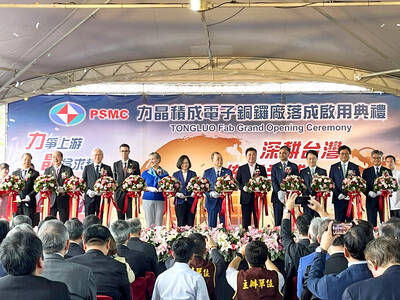Yageo Corp (國巨) plans to transfer NT$10 billion (US$332.37 million) from abroad to boost capacity and research and development (R&D) for high-end passive components used in automobile and industrial devices.
The move demonstrates Yageo’s commitment to increasing its investments in Taiwan, as the nation plays an important role in its manufacturing of niche products and R&D efforts, the Kaohsiung-based company said yesterday.
Yageo, the world’s third-largest passive components maker, generated about half of its total production and 90 percent of its R&D at its Kaohsiung operations and R&D center, it said in a statement.
“To meet growing demand from 5G technology and automotive electronics, the company has launched a series of investments in Taiwan in the past few years,” Yageo said.
The investments would “help the company fuel growth momentum in the long run.”
Passive components used in industrial devices and automobiles contributed 31 percent and 15 percent respectively to Yageo’s total revenue of NT$31.29 billion in the first three quarters of last year.
Last month, the company signed a letter of intent with the Southern Taiwan Science Park (南部科學園區) to build a new production line in Kaohsiung’s Ciaotou District (橋頭).
Yageo plans to hire 900 workers for the Ciaotou line and recruit 200 engineers to expand its R&D team, it has said.
The company earlier last year also secured a government loan of NT$16.5 billion to fund its domestic investment and acquired land in Kaohsiung’s industrial zone to build a new factory.
To solve supply constraints, Yageo said it has boosted its equipment utilization rate for multilayer ceramic capacitor and chip resistors to about 50 percent, from as low as 25 percent in October last year.
However, labor shortages in China remain an obstacle to boosting utilization rate in the short term, the company said.
Separately, Yageo’s board of directors has approved offering 80 million new common shares in the form of global depositary receipts (GDRs), as the company aims to raise funds to replenish operating capital, repay debts and purchase raw materials, according to a regulatory filing on Tuesday.
The GDR offering is to boost the firm’s share capital to 509.05 million shares from 429.05 million, but would dilute its earnings per share by 18 percent, the company said.

BUSINESS UPDATE: The iPhone assembler said operations outlook is expected to show quarter-on-quarter and year-on-year growth for the second quarter Hon Hai Precision Industry Co (鴻海精密) yesterday reported strong growth in sales last month, potentially raising expectations for iPhone sales while artificial intelligence (AI)-related business booms. The company, which assembles the majority of Apple Inc’s smartphones, reported a 19.03 percent rise in monthly sales to NT$510.9 billion (US$15.78 billion), from NT$429.22 billion in the same period last year. On a monthly basis, sales rose 14.16 percent, it said. The company in a statement said that last month’s revenue was a record-breaking April performance. Hon Hai, known also as Foxconn Technology Group (富士康科技集團), assembles most iPhones, but the company is diversifying its business to

ARTIFICIAL INTELLIGENCE: The chipmaker last month raised its capital spending by 28 percent for this year to NT$32 billion from a previous estimate of NT$25 billion Contract chipmaker Powerchip Semiconductor Manufacturing Corp (力積電子) yesterday launched a new 12-inch fab, tapping into advanced chip-on-wafer-on-substrate (CoWoS) packaging technology to support rising demand for artificial intelligence (AI) devices. Powerchip is to offer interposers, one of three parts in CoWoS packaging technology, with shipments scheduled for the second half of this year, Powerchip chairman Frank Huang (黃崇仁) told reporters on the sidelines of a fab inauguration ceremony in the Tongluo Science Park (銅鑼科學園區) in Miaoli County yesterday. “We are working with customers to supply CoWoS-related business, utilizing part of this new fab’s capacity,” Huang said, adding that Powerchip intended to bridge

Microsoft Corp yesterday said that it would create Thailand’s first data center region to boost cloud and artificial intelligence (AI) infrastructure, promising AI training to more than 100,000 people to develop tech. Bangkok is a key economic player in Southeast Asia, but it has lagged behind Indonesia and Singapore when it comes to the tech industry. Thailand has an “incredible opportunity to build a digital-first, AI-powered future,” Microsoft chairman and chief executive officer Satya Nadella said at an event in Bangkok. Data center regions are physical locations that store computing infrastructure, allowing secure and reliable access to cloud platforms. The global embrace of AI

Qualcomm Inc, the world’s biggest seller of smartphone processors, gave an upbeat forecast for sales and profit in the current period, suggesting demand for handsets is increasing after a two-year slump. Revenue in the three months ended in June will be US$8.8 billion to US$9.6 billion, the company said in a statement Wednesday. Excluding certain items, earnings will be US$2.15 to US$2.35 a share. Analysts had projected sales of US$9.08 billion and earnings of US$2.16 a share. The outlook signals that the smartphone market has begun to bounce back, tracking with Qualcomm’s forecast that demand would gradually recover this year. The San